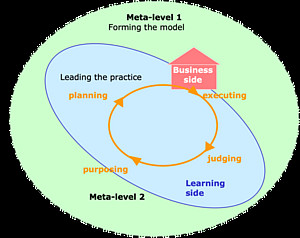Pedagogical concept
The practice enterprise is based on a business simulation for learning purposes and, as an action- and competence-oriented method, focuses on promoting the linking of thinking and acting. The Grazer practice enterprise model shows the three different perspectives of a practice enterprise, which are applied in the UniLine Education & Consulting GmbH: Business side, Learning side und Meta-level.
The red house represents the business side of the UniLine where all students do their daily business. The students take on the role of the employees. An attempt is made to create a model of reality that is as relevant to practice as possible.
One of the peculiarities of UniLine as a practice enterprise is, that highly active, independent, and self-responsible master students manage the practice-enterprise within a university course. Part of the coursework is done by actively working within the processes and different departments of the practice enterprise. For realizing their practice enterprise chores, students can use online collaboration tools as well as an extra office within the Resowi-Center of the University of Graz. This provides the structural framework for self-regulated learning and working of the students. Most of the students are able to further develop their individual professional goals within this framework.
The lessons apart from the learning and working in the PE-office are designed as weekly meetings. The teachers of the university course use team teaching and act in the part of the management team. The meetings iterate between business and pedagogical meetings, with different focus topics every week. In the pedagogical meetings, the discussion on relevant literature concerning the teaching-learning-setting as well as the design of a practice enterprise is always part of the agenda.
For the teachers, leading the practice enterprise is characterized by the role-duality as teachers and managers. This implies a changed perception of their role as teachers. Beside accompanying the learning processes of the students by coaching, moderating, and consulting, they also take on the responsibility as management to secure the continuity of the practice enterprise work throughout the semester. They apply a participative leadership style, aiming to achieve transformative leadership, to empower students to partake actively and take on responsibility within the practice enterprise. They enable this by providing leeway in timing, operations, and decision-making freedoms to the students. They also role model enthusiasm for innovation, performance orientation and reflexivity to the students.
The learning side creates a framework in which students can go through the cycle from goal setting, through planning and executing the actions, to judging and purposing. The method practice enterprise provides a safe and secure learning environment and leads to the development of skills and competences that assist students in the process of becoming highly employable.
With the meta-level, a distinction is made between two perspectives. The meta-level 1 focuses on the design of the model respectively on the modelling. There are different instruments to develop a valid model of a practice enterprise. The meta-level 2 deals with questions of pedagogy, methods, and didactic concerns as well as the roles of a practice enterprise teacher. The students learn how form an optimal practice enterprise and how to manage a practice enterprise at school.
This also shows the multidimensionality of the teaching-learning-setting for the students, because their learning-process happens on different levels. They are employees in the business simulation UniLine, students, who aim to increase their competencies as well as future teachers. The teachers do discuss this differentiation of these different roles with them to help them recognize the learning opportunities on each level. Throughout the semester students develop an understanding of the role as a teacher and the practice of designing and modelling a practice enterprise.
UniLine is a place of working and learning for students as well as for teachers. The strategy of the management is to explore the topic practice enterprise as a teaching and learning method and to show and experience how designing and leading a practice enterprise works. Therefore, students move through the whole learning process with a high level of personal responsibility. Instead of viewing themselves as the only source of information or knowledge, teachers need to act as moderators and coaches and promoters for innovation and reflection.
